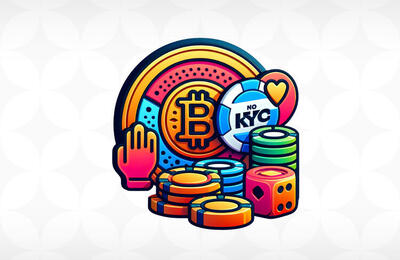
Cryptocurrencies like Bitcoin, Ethereum, Litecoin, and Ripple are digital or virtual currencies that have revolutionized financial transactions globally. They operate independently of a central bank and utilize a decentralized system to record undertakings and issue new units while relying on blockchain technology.
Their integration into the gambling sector started in the early 2010s. Bitcoin casinos were among the first platforms to emerge, shining a light on innovative ways to bypass traditional financial systems and ensure greater privacy for users. Initially, players were hesitant to adopt this new approach due to limited information and understanding, but as time passed, the pros and cons became more apparent, which allowed users to make better-informed choices.
Pros of Gambling with Crypto
Anonymity and Privacy
Traditional betting often requires sharing personal and financial details, leading to potential privacy breaches. However, crypto-based gambling platforms allow players to engage without revealing sensitive information, and this is particularly appealing in regions where the sector faces societal scrutiny or legal restrictions.
Transactions utilizing digital currencies rely on blockchain technology. This method logs activity across multiple computers, effectively guaranteeing that no single entity dominates or accesses the data. Consequently, every operation secures its anonymity and safety while the blockchain authenticates these actions and preserves the confidentiality of the participants' identities.
Transaction Speed
Deposits and withdrawals using cryptocurrencies are completed almost instantaneously — surely a rapidity that stems from the absence of typical intermediaries in conventional banking systems.
Once again, all credit is due to blockchain technology, which facilitates transactions between parties without the need for time-consuming verifications and approvals, thereby dramatically reducing processing times. Consequently, players enjoy swift access to their funds, both when initiating a game or cashing out winnings.
Low Transaction Costs
Unlike the higher charges often seen with traditional financial methods, cryptocurrency transactions are renowned for their low fees. This cost reduction is primarily due to its decentralized nature, which eliminates the need for banks or other financial intermediaries.
This economic advantage is particularly noticeable in cross-border exchanges, where traditional methods typically incur substantial charges. By significantly lowering these costs, they make online gambling more accessible and ensure a more significant portion of winnings stays with the player.
Global Accessibility
Crypto effectively breaks down geographical barriers and opens doors for users around the globe since it operates on a global network unbound by country-specific banking regulations and currency exchange issues. This universal network allows a wide array of games — progressive jackpots, classic table games, keno, bingo, and online slots — to be accessible to players regardless of location.
This shift towards inclusivity eliminates the constraints once imposed by location and currency and opens up opportunities for a broader audience. As a result, the player base expands significantly, fostering a more interconnected and accessible environment.

Cons of Gambling with Crypto
Volatility
The significant fluctuations directly affect the stakes in the crypto-gambling sphere. A player's deposit could drastically increase or decrease in value over a short period, leading to unpredictable changes in their budget. For instance, a drop in the value could mean a reduction in the player's potential betting power or winnings. Conversely, a surge in value could unexpectedly increase their stakes.
This unpredictability adds an extra layer of risk that goes beyond game-related uncertainties, hence requiring careful financial management from players.
Regulatory Issues
The legal landscape for crypto gambling presents complex challenges due to its lack of universal legal recognition. Different countries have diverse regulations, which naturally affects its legality. For instance, some jurisdictions view the subject as a grey area and lack clear guidelines or regulatory frameworks.
Additionally, the evolving identity of cryptocurrency regulation means that legal stances can change rapidly. It also means that stakeholders should remain vigilant and adapt because of this ever-shifting legal terrain.
Security Concerns
While innovative, crypto gambling brings specific security risks, notably hacking and irreversible operations. Its digital nature makes it a prime target for cyberattacks, where hackers may attempt to breach wallets or gaming platforms. Unlike traditional banking, hacked crypto funds often cannot be retrieved due to being irreversible. This irrevocability means that once a transaction is made, it cannot be reversed, even in cases of error or fraud.
Dispute Resolution Challenges
Another challenge is the limited recourse for dispute resolution and consumer protection. Traditional gambling systems often have established regulatory bodies and dispute-resolution mechanisms to provide a safety net for consumers. However, the decentralized nature of cryptocurrencies means there is no central authority to oversee transactions or mediate disputes. This absence leaves players with minimal options if issues arise, such as disputed bets or gaming irregularities.















